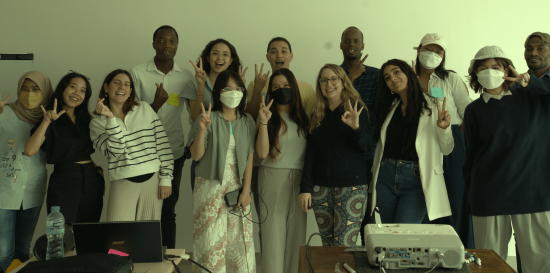17/03/2023
Immaculada Rosell, lecturer at the Faculty of Legal Sciences and speaker at the International Student Conference 2023
“It is enriching to learn about a culture that is very different from your own and to interact with people from all over the world”

Immaculada Rosell was one of the members of the URV participating in the International Student Conference 2023 held at Indonesia
From 3 to 7 January 2023, the International Student Conference 2023 was held at the Universitas Katolik Parahyangan (Bandung, Indonesia). Immaculada Rosell was one of the members of the URV participating in the event.
How would you describe your first experience teaching workshops at the International Student Conference (ISC)?
When I heard about the opportunity to share my knowledge about disability at the conference “Inclusion and Accessibility to Well-being and a Sustainable Life after the Pandemic” I did not think twice. As a lecturer on the Bachelor’s Degree in Social Work, it was definitely an opportunity to travel to a developing country. Up to that moment, I had never travelled outside Europe and going by myself has contributed to my personal and professional growth. It was amazing to meet people and make friends from all over the world. And I must mention the welcome we received from both the organizers and students, who had put their heart into the conference
What attracted you to speak about the topic, inclusion, and accessibility for well-being and a sustainable post-pandemic life?
The theme of the conference was fully aligned with my professional experience and my personal interests in terms of research. In recent years I have specialized in the field of employment for people with disabilities who have particular difficulty in this area. I carried out a research project on employment policies in several European countries, and I am now developing and coordinating employment projects as well as teaching at the URV, all of which I find very enriching.
The main reason why I wanted to participate in the conference was not so much to have the opportunity to share my knowledge, but to talk with people from all over the world about the employment of people with disabilities in their countries. Without any doubt, I achieved my goal.
How did you find out that you could take part?
A couple of years ago, I had a youth guarantee grant to manage the INSERLAB URV project with Professor Teresa Torres, coordinator of the programme. One morning, we bumped into each other on the train and when I finished work, I had a message asking if I might be interested in ti. I remember that at that moment I felt excited and dizzy at the same time, but I like to feel that I challenge myself on a daily basis and here I had to overcome one more challenge.
What kind of workshop did you give?
The workshop I gave was designed for students to understand and discuss how to enhance the employment possibilities of people with disabilities. The idea was that it would be a dynamic session in which students would interact with other international students and finish the session with a broader vision of what disability is and how we can create accessible environments. During the session, I used design thinking techniques and presented some good practices of educational inclusion, and of course, I discussed the Inserlab URV project as an example of a successful experience.
How was the interaction with the students?
The fact that I had given the workshop on this topic had an effect on the students, who came up to me with questions for the rest of the conference, and on the last day, they presented several projects on inclusion. Some proposed improvements at their universities and others compared the situation of people with disabilities in their respective countries. All in all, it was very interesting.
Did you find the international environment challenging?
Language was a challenge but you have to rise to it! And at the beginning I was afraid of making a presentation that did not represent the cultural diversity there. These are issues that I had to reflect on all the time I was preparing and which I obviously had to bear in mind when teaching the workshop
How do you rate the experience of teaching in an environment that encourages new intercultural learning methods? What personal and academic benefits can you get out of it?
The experience was incredible. As well as the academic experience, it is enriching to learn about a culture very different from yours and interact with people from all over the world. In general, the contrast is amazing. The benefits in the personal sphere are endless: you have more self-confidence and new opportunities, you begin to distrust stereotypes and are more able to adapt, you become more tolerant and flexible. Academically, it gives you the opportunity to network with other teachers with similar interests, although they have other perspectives, and you can also improve your language skills.
To sum up, I would like to thank both the URV and the Parahyangan Catholic University for making it possible for me to have this experience and I want to encourage you to be next. You can’t miss out on an experience like this one!
